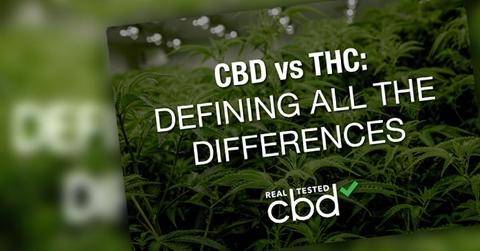 NEWS
NEWSCBD vs THC: The Ultimate Introductory Guide

July 28 2020, Updated 10:10 p.m. ET
This article was originally published on Real Tested CBD. To view the original article, click here.
CBD vs THC: The Ultimate Introductory Guide
When you walk into a shop that sells CBD, or cannabidiol, products, your first instinct might be to avert your eyes. Isn’t that made from marijuana? Is it even legal? It is, and many people are using it to improve their health and relieve symptoms of ailments.
What you really might be wondering is if cannabidiol will make you high. It won’t. Although it does come from the same plant family as pot, cannabidiol has no psychoactive properties and isn’t intoxicating. Plus, a great deal of research indicates that cannabidiol is promising for treating physical and psychological conditions, such as chronic pain, anxiety and inflammation. It may even protect the brain from age-related cognitive decline and memory loss.
How do THC and CBD Affect the Body?
THC, or tetrahydrocannabinol, and cannabidiol are compounds found in the cannabis plant. Both tetrahydrocannabinol and cannabidiol interact with the body’s endocannabinoid system. This is a network of receptors within all vertebrates’ bodies that helps to maintain equilibrium.
The endocannabinoid system is a relatively recent discovery. During a government-funded St. Louis University School of Medicine study, two researchers were able to pinpoint the receptor sites in the brain that respond to the elements that are found in this plant family.
Want OK! each day? Sign up here!
For that reason, those receptors were named cannabinoid receptors. They’re the most prevalent type of receptor for neurotransmitters in the brain. Eventually, it was found that cannabinoid receptors exist throughout the human body.
Are you a senior curious to learn more about how CBD could benefit you? Click here for your comprehensive guide to all things CBD.
The body makes its own chemicals that interact with these receptors. These neurotransmitters play a role in learning, memory, sleep, appetite, mood, reproductive function, immune function and metabolism.
As cannabinoid receptors are located all over the body, including in the skin, organs and central nervous system, they play an essential role in keeping our body in harmony. But medical conditions and mental disorders can put people out of balance.
If your own body can’t regulate itself with endogenous cannabinoids, the neurotransmitters that you produce, researchers began to wonder how exogenous cannabinoids could improve health issues. This created a whole new body of research into products that contain cannabinoids.

